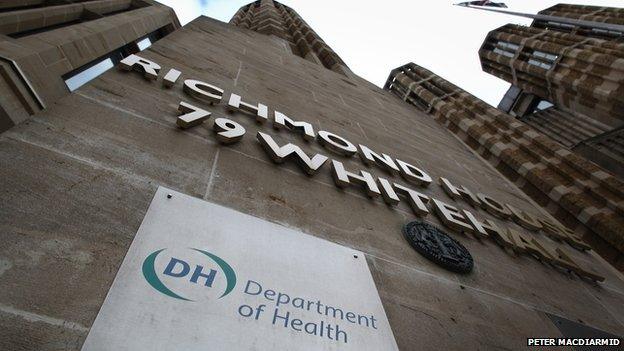New parliament, new majority government - what next for the NHS?
- Published

The new ministerial team at the Department of Health is in place - now its time to face up to what David Cameron called "down-to-earth, bread-and-butter issues" which he said his Government should focus on.
One of those is the state of the NHS and its direction of travel over the next five years.
The immediate signal from the Department is that there will be no radical change of course. Major reorganisations similar to the upheaval seen in the last parliament are not on the agenda.
The Secretary of State Jeremy Hunt has let it be known that his focus will be on "out of hospital" care. He used his first two years in the post to concentrate on what he saw as the urgent need to improve safety and transparency inside hospitals in the wake of the Mid Staffs scandal. He now says there should be a push for higher standards of care for the elderly and most vulnerable patients provided by GP surgeries, community and social care.
Bread and butter work
Tackling dementia was a priority for the last Government. That is still the case. But ministers are also aware of the increasing obesity challenge to the NHS. The costs associated with treating diabetes are mounting - on one estimate around 10% of the NHS budget. Those who are overweight or obese are more at risk of developing Type 2 diabetes. A new initiative in this area by the Department of Health seems likely.
While Jane Ellison remains in her post as public health minister, there are intriguing changes elsewhere in the department.
As Dan Poulter departs, Ben Gummer arrives as a new minister. He made a name for himself campaigning on behalf of Ipswich Hospital to secure a heart centre. He also pushed the Treasury successfully for taxpayers to be sent itemised statements setting out how their money is spent. Might he take a close interest in NHS spending?
The new Minister of State Alistair Burt is an old Whitehall hand, having served in John Major's Government and at the Foreign Office after the 2010 election. He has campaigned on behalf of victims of the tainted blood scandal. One of Mr Hunt's final statements in the last parliament followed the Penrose inquiry in Scotland into the use by the NHS of contaminated blood products. He said a new and broader compensation scheme for victims would be drawn up. It may well fall to Mr Burt to see that through.
As for the opposition, its too early to say what angles will be pursued. Andy Burnham's position is well known and he will probably continue to highlight the use of private provision in the NHS. He may be distracted for a while by a Labour leadership bid - as would shadow care minister Liz Kendall - though that could itself involve a campaign around health.
Cash flow
Hovering over the Department of Health is a financial shadow. The new ministers will quickly be brought up to speed by their colleagues on the short- and medium-term challenges to the NHS budget.
Health trusts have been warning in recent weeks that there is a danger of a significant deficit in the current financial year, perhaps running to 拢2 billion. They claim to be under massive strain and that a new cash injection from Government will be required.
For now, ministers are making clear that everything the head of NHS England Simon Stevens asked for to cover the current financial year was provided. They are in no mood to pull out the cheque book just yet and don't want to be seen to be caving in to the demands of the leading hospitals.
Summer will give way to autumn. By the time the leaves are falling from the trees, the readiness of the NHS for winter will again be high on the agenda. Claims that the service is creaking at the seams and that the money is running out will be made again. Ministers at the Department of Health will have to start thinking now how they are going to tackle that.
- Published27 March 2015